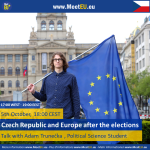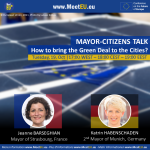9 November 2021 — On the 133rd anniversary of Jean Monnet’s birth, and with close to forty projects submitted in a single month, we are delighted to announce the results of the Jean Monnet Prize for European Integration 2021.
EuropeanConstitution.eu awards the 2021 Jean Monnet Prize for European Integration to the Youth Cluster, a Portuguese project aiming to tackle youth unemployment and providing young people with mentoring and essential information on national and European opportunities. The project is an example of youths’ mutual support, with young Europeans who have found opportunities coming together to share their experience and knowledge of national and European work and training programmes. The second place goes to MeetEU as a powerful platform connecting Europeans to discuss EU matters. The third place goes to the Mepassistant Twich channel for its unconventional way to take the EU and its representatives to the new generations.

Despite an overall improvement of the continent’s health situation due to mass vaccination, 2021 remained a difficult year for in-person activities and grassroots projects. It is therefore not a coincidence that all three awarded projects are online-based. Nevertheless, this edition of the Jean Monnet Prize gathered a record forty projects in a single month, given this year’s shortened application period — a vibrant testimony attesting of the vitality of citizens’ engagement in favour of a more united and integrated Europe.
Once again, projects displayed, in the best of lights, the engagement and fertile imagination that citizens are capable of. We heard about translation as an art form, language classes for minorities and migrant communities, and journalists collecting testimonies to ask a departing Angela Merkel the perfect question. We heard about citizens designing and spreading logos to improve the visibility of the European emergency phone number (112, in case you had a doubt). We heard about poetry, reconciliation, news sites, heritage, and many, many podcasts!
Most of all, this year marked a return of the Jean Monnet Prize to its roots. After two years with a prize awarded to larger projects led by professional organisations — the wonderful EuropeTalks by ZEIT Online, in 2019, and Home is Where the Herz Is by Metropole, in 2020 — we chose to favour smaller-scale and citizens-led initiatives. We believe that projects of all sizes can have a tremendous impact and we wish to be a reminder that citizens themselves can be the drivers of European integration.
And now, ‘nough said, let’s dive in!
Europe, all fun and games

Despite welcome efforts and millions of euros spent on communications campaigns, reports, and social media activity, it is fair to say that the European Union remains unknown to many of its citizens. This may particularly be the case for a part of the younger generations. To be sure, the presence of EU leaders on social media networks, such as Instagram or Facebook, is always a step in the right direction, but simply do not seem to be sufficient.
Therefore, for its efforts to take the EU, its policies, its institutions and its representatives, closer to younger Europeans, the third place of the Jean Monnet Prize 2021 goes to the Mepassistant, a Twitch channel about the European Union! Launched by former MEP assistant Quentin Deschandelliers, the channel mixes politics, EU news, live interviews and, as usual with Twitch, a healthy dose of video games (financially supported by the EU through its Creative Europe programme).
Since the launch of the channel, over 50 live streams have taken place, cumulating over 90 hours of broadcast, with 22 MEPs interviewed and an additional 16 scheduled for the remainder of 2021. For good measure, the channel is further supplemented by a Twitter account, a YouTube channel, and a Discord server. While this new project remains limited in scope and membership, it is a great example that discussions about Europe need not remain limited to official conferences or panels of experts!

European integration is about making Europe “real” and concrete for its citizens. This project creates an interface between Europe and its citizens, to help them (re)connect. Bringing European politics to platforms like Twitch is essential to make it accessible and foster European democracy.
Quentin Deschandelliers, creator of the Mepassistant Twitch channel
Knowing me, knowing EU
2021 marks an important milestone for the European Union, with the launch of the much-discussed Conference of the Future of Europe — the EU’s flagship initiative to reconnect with citizens, debate Europe’s challenges and priorities, and establish a clear direction for the future. Postponed in 2020, the Conference had already been announced ahead of the 2019 European elections, at the time when the European Parliament led its #ThistimeImvoting campaign, aimed at mobilising European voters.
But some Europeans won’t just talk when they’re asked, and a group of volunteers from the 2019 campaign decided to remain mobilised and to set up an online participatory forum for Europeans to come together and discuss Europe, its present and future. For this commitment to keep the dialogue open, the second place of the Jean Monnet Prize 2021 goes to MeetEU, a pan-European discussion community for all things European.
MeetEU alternates encounters with MEPs, experts and activists, with practical workshops aimed at going in depth on specific topics. Over its year and half of existence, the project has invited over fifty speakers, including MEPs from across the political spectrum, and gathered 1,300 participants to discuss, on a weekly basis, the EU Green Deal, enlargement, security, energy policy, gender equality, migration and more. The group has since used its discussions to contribute to the Conference on the Future of Europe.
It is not governments who create a united Europe. It is you and me. And what better way is there to advance integration than getting people from all walks of Europe to talk Europe to each other in a positive, constructive environment. This is what MeetEU is all about!
Tina Löhr, Founder and Project Coordinator of MeetEU

Bottom: Klaus Feldmann (DE) – Research, Eion Reid (IE) – Event Coordinator, and Dinis de Oliveira Fernandes (PT) – Social Media and Event Coordinator
This project is therefore a wonderful example of unintended co-production of the European project: EU institutions launch a project gathering citizens around elections, the project ends but takes a life of its own, leading to citizen-led discussions and input for the future of the Union. Call it the participatory equivalent of Jean Monnet’s spill-over strategy for the unification of Europe.
Economic opportunities for youths, by youths
Given the lack of a integrated public sphere at the European level and the mostly nation-centric approach to European affairs by many Member States, there is a dire and continuous need to introduce European citizens to their common institutions, encourage them to discuss across borders, and provide them with accessible platforms to do so. This integration by stimulating exchanges between citizens has been at the core of many projects received by EuropeanConstitution.eu for the Jean Monnet Prize over the years. Understandably, this has also been the core topic of many rewarded projects.
However, important as this may be, European integration need not be “simply” about citizens discussing across borders.
We are reminded that, before it evolved into the Union we know today, the EU started as a common market and, as Brexit recently underlined, this market cannot be separated from the “four freedoms” of the Union: the free movement of people, goods, capital and services. Beyond access to a larger market for a Member State’s companies, these freedoms include European citizens’ guaranteed right to travel and seek opportunities across Europe.
This circulation of Europeans, often epitomised by the EU’s successful and popular Erasmus programme, is at the heart of what Jean Monnet called, in his drafting of the Schuman Declaration, “une solidarité de fait” — a de facto and tangible solidarity. By moving and living across borders, whether temporarily or permanently, Europeans create integration in practice and build permanent and indelible connections with each other. The EU’s single market, when accessible to all, can therefore be a tremendous force for European integration.
Unfortunately, many citizens, in particular youths, remain insufficiently aware of the breadth of opportunities available to them, and the all-youth team of Associação Youth Cluster is working hard to fill this gap. Therefore, for its efforts to give back the experience and opportunities they received and to promote the single market as a tool for integration and shared prosperity, EuropeanConstitution.eu is proud to award the 2021 Jean Monnet Prize for European Integration to the Portuguese “Youth Cluster” project.

Founded by nine young Europeans who themselves benefited from European programmes — including the European Solidarity Corps, Erasmus for Young Entrepreneurs, Erasmus+ Youth Exchanges —, the Youth Cluster platform gathers information about programmes available for young people living in Portugal and provides individualised mentoring for youths in search of opportunities. In order to increase its reach across the country, the Youth Cluster also developed a number of partnerships with newspapers, educational institutions, associations and municipalities, and now achieves 3,000-6,000 visits a month. Following the success of the Portuguese version, the platform was translated into English and upcoming versions in Swedish and Greek are being developed.
In a country where youth unemployment, at 23.7% in September, remains far above the EU’s average and the fifth highest in the Union, the chance to study abroad, acquire extra skills and competencies, and use these as a stepping stone for prosperity must be cherished and encouraged.
The initiative of Associação Youth Cluster and the inspiring testimonies it receives are a vibrant reminder that European integration means a fundamental right to circulate between European countries, gain experience, make a living, and head back or create a new home wherever we choose — and that we can all contribute to this beautiful project, sometimes simply by sharing the information we got and extending a helping hand.
For the Youth Cluster, European Integration starts by promoting a greater comprehension of the European project among young people by allowing us to visit, volunteer, work and make connections in European countries. It means learning from each other, in order to embrace a common way of living based on freedom.
Margarida de Freitas, Co-founder and President of the Board of Associação Youth Cluster
Once again, we would like to sincerely thank all the applicants for their contributions and incredible work; our patron, the European Parliament, the representations of the European Commission and our pro-European partners for their trust and support in broadcasting this initiative; and, beyond them, all those who have supported, contributed to, and promoted this 2021 edition.
European integration is our common goal and we are honoured to bring our contribution to this effort. We look forward to further editions of the Jean Monnet Prize, as well as to other European initiatives!
If you wish to support our work promoting European integration, consider donating to EuropeanConstitution.eu!
The Jean Monnet Prize 2021 was organised in partnership with:











